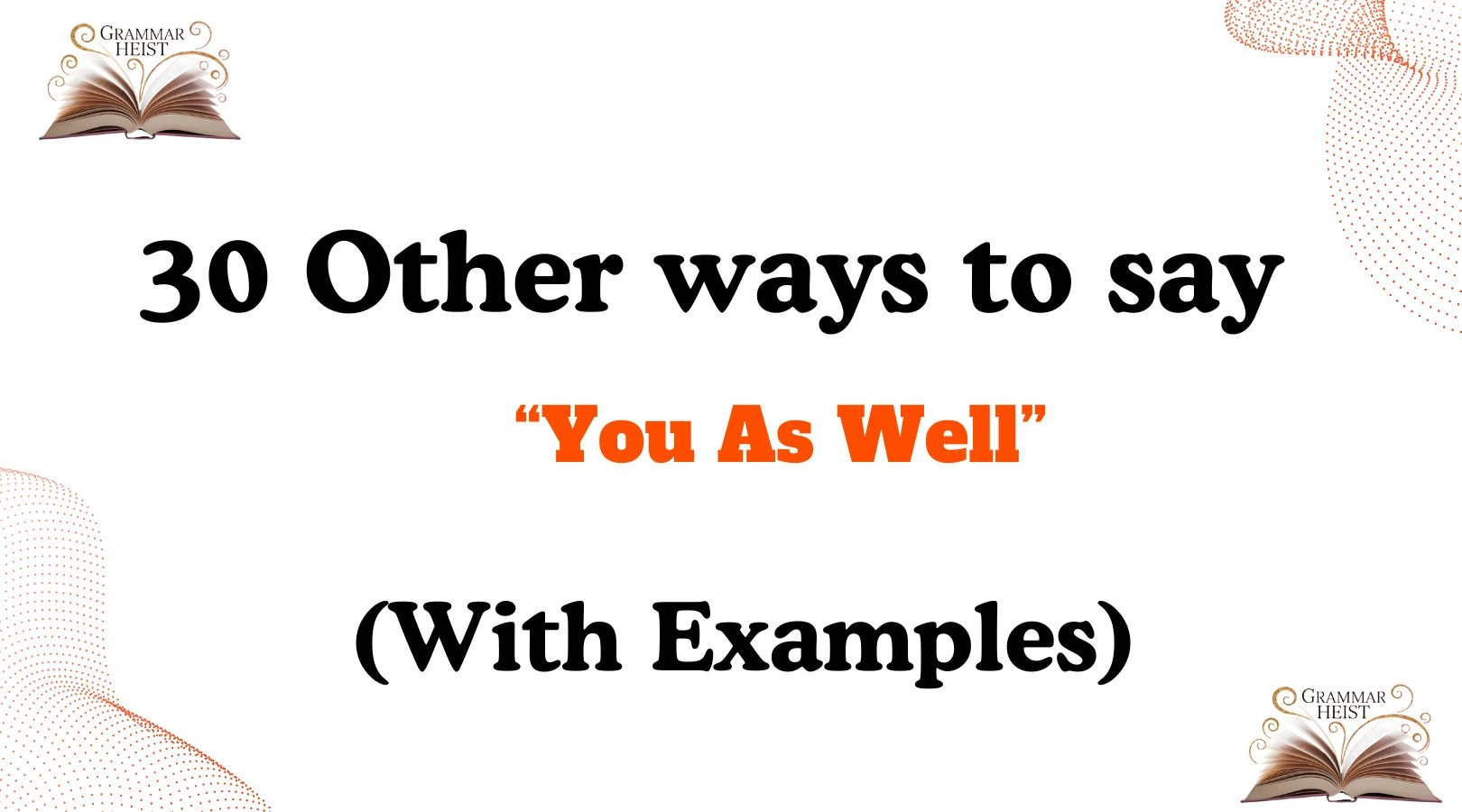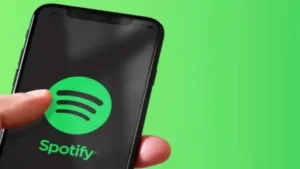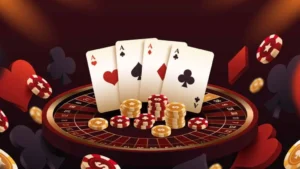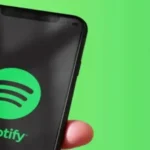Finding the right words to express care and warmth can make even the simplest exchange feel more meaningful. Saying “You as well” is a kind and polite response, but sometimes you might want to sound more personal, friendly, or heartfelt. Whether you’re replying to a thank you, a greeting, or a good wish, these 30 other ways to say “You as well” can help you express yourself in a way that fits the tone, relationship, and situation perfectly.
What Does “You As Well” Mean?
The phrase “You as well” simply means “the same to you.” It’s often used to return a good wish or greeting politely. For example:
- “Have a great day!” → “You as well!”
- “It was nice meeting you.” → “You as well!”
It’s a short and thoughtful reply that mirrors kindness or gratitude back to the speaker.
Is It Professional or Polite to Say “You As Well”?
Yes, “You as well” is both polite and professional. It works in workplaces, emails, or formal settings without sounding too casual. However, in very formal writing or when you want to add warmth, you can choose alternatives that sound more refined or personal like “Likewise,” or “The pleasure is mine.”
Pros or Cons
Pros:
- Sounds polite and friendly.
- Works in almost every setting.
- Easy and natural to use in conversation.
Cons:
- May sound too generic or repetitive.
- Lacks emotional depth in close conversations.
- Can feel formal in casual, friendly chats.
Synonyms For You As Well
- You too
- Likewise
- Same to you
- Right back at you
- The pleasure is mine
- I appreciate that
- Thanks, you too
- You take care too
- My pleasure
- And you
- You got it too
- I feel the same way
- You as well, take care
- Back at you
- You have a great one too
- You make sure to rest too
- You too, stay safe
- Hope you have a great one too
- Wishing you the same
- You deserve that too
- You too, my friend
- It’s been lovely talking to you
- You’re so kind — same goes to you
- That means a lot — same to you
- You have a wonderful day too
- You’re welcome, and the same to you
- I hope you enjoy it too
- All the best to you too
- You too, don’t work too hard
- I’m grateful for you too
1. You Too
Scenario: When someone wishes you well or says goodbye.
Examples:
- “Have a good evening!” → “You too!”
- “Enjoy your meal!” → “You too!”
- “Stay safe out there.” → “You too!”
Tone: Friendly and casual.
Explanation: A simple and natural alternative perfect for everyday conversations.
2. Likewise
Scenario: Responding to greetings or positive wishes politely.
Examples:
- “It’s been a pleasure working with you.” → “Likewise.”
- “Nice meeting you.” → “Likewise.”
- “I enjoyed the chat.” → “Likewise.”
Tone: Professional and courteous.
Explanation: Ideal for formal or semi-formal settings.
3. Same to You
Scenario: When someone wishes you something positive.
Examples:
- “Happy holidays!” → “Same to you!”
- “Have a good night!” → “Same to you!”
- “Hope you enjoy your weekend.” → “Same to you!”
Tone: Neutral and polite.
Explanation: A warm and versatile response suitable for most situations.
4. Right Back at You
Scenario: When you want to sound friendly and lighthearted.
Examples:
- “You’re amazing!” → “Right back at you!”
- “Have a fun weekend!” → “Right back at you!”
- “Take care of yourself!” → “Right back at you!”
Tone: Cheerful and informal.
Explanation: Adds a fun, friendly vibe to your reply.
5. The Pleasure Is Mine
Scenario: When someone thanks or compliments you.
Examples:
- “It was wonderful meeting you.” → “The pleasure is mine.”
- “Thank you for your help.” → “The pleasure is mine.”
- “Nice to see you again.” → “The pleasure is mine.”
Tone: Polite and refined.
Explanation: Perfect for formal or professional situations.
6. I Appreciate That
Scenario: When responding to kind wishes or compliments.
Examples:
- “You did a great job!” → “I appreciate that.”
- “Thanks for being here.” → “I appreciate that.”
- “You’re really kind.” → “I appreciate that.”
Tone: Sincere and warm.
Explanation: Shows gratitude while maintaining professionalism.
7. Thanks, You Too!
Scenario: When someone thanks or wishes you well.
Examples:
- “Have a great day!” → “Thanks, you too!”
- “Stay safe!” → “Thanks, you too!”
- “Good luck with your project.” → “Thanks, you too!”
Tone: Friendly and casual.
Explanation: A balanced mix of politeness and warmth.
8. You Take Care Too
Scenario: When someone shows care or concern.
Examples:
- “Take care!” → “You take care too.”
- “Drive safe!” → “You take care too.”
- “Stay healthy!” → “You take care too.”
Tone: Caring and gentle.
Explanation: Adds emotional depth to a simple goodbye.
9. My Pleasure
Scenario: When thanked for a favor.
Examples:
- “Thanks for helping me.” → “My pleasure.”
- “I appreciate your time.” → “My pleasure.”
- “You’ve been very kind.” → “My pleasure.”
Tone: Polite and gracious.
Explanation: Shows that you were happy to help.
10. And You
Scenario: Short and simple acknowledgment.
Examples:
- “Good luck!” → “And you!”
- “All the best!” → “And you!”
- “Have fun!” → “And you!”
Tone: Light and conversational.
Explanation: A minimalistic yet friendly way to return good wishes.
11. You Got It Too
Scenario: When someone compliments you.
Examples:
- “You’re awesome!” → “You got it too!”
- “You’re so talented.” → “You got it too!”
- “You’re kind.” → “You got it too!”
Tone: Playful and confident.
Explanation: Great for friendly, upbeat exchanges.
12. I Feel the Same Way
Scenario: When expressing mutual feelings.
Examples:
- “It’s been great working together.” → “I feel the same way.”
- “I really enjoy our talks.” → “I feel the same way.”
- “You’re a great friend.” → “I feel the same way.”
Tone: Warm and emotional.
Explanation: Ideal for showing genuine connection.
13. You As Well, Take Care
Scenario: When ending a conversation warmly.
Examples:
- “Have a nice day!” → “You as well, take care.”
- “Goodbye!” → “You as well, take care.”
- “Stay safe!” → “You as well, take care.”
Tone: Kind and caring.
Explanation: Adds a personal touch to a polite response.
14. Back at You
Scenario: When someone gives you praise or good wishes.
Examples:
- “You look great today!” → “Back at you!”
- “You’re amazing!” → “Back at you!”
- “You’re so positive.” → “Back at you!”
Tone: Fun and friendly.
Explanation: Shows shared positivity in a lighthearted way.
15. You Have a Great One Too
Scenario: When someone wishes you well.
Examples:
- “Have a great evening!” → “You have a great one too!”
- “Enjoy your day!” → “You have a great one too!”
- “Happy weekend!” → “You have a great one too!”
Tone: Cheerful and kind.
Explanation: Makes your response feel genuine and warm.
16. You Make Sure to Rest Too
Scenario: When someone reminds you to rest or take care.
Examples:
- “Don’t forget to take a break.” → “You make sure to rest too.”
- “Take it easy this weekend.” → “You make sure to rest too.”
- “Get some sleep tonight.” → “You make sure to rest too.”
Tone: Caring and considerate.
Explanation: This phrase adds a nurturing tone, showing mutual care and concern.
Read More:30 Other Ways to Say ‘Please See Attached’ (With Examples)
17. You Too, Stay Safe
Scenario: When someone expresses safety or well-being wishes.
Examples:
- “Have a safe drive home.” → “You too, stay safe.”
- “Take care on your trip.” → “You too, stay safe.”
- “Be careful out there.” → “You too, stay safe.”
Tone: Warm and thoughtful.
Explanation: Adds empathy, making your reply sound heartfelt.
18. Hope You Have a Great One Too
Scenario: When someone shares a cheerful wish.
Examples:
- “Enjoy your weekend!” → “Hope you have a great one too.”
- “Happy holidays!” → “Hope you have a great one too.”
- “Have fun!” → “Hope you have a great one too.”
Tone: Friendly and upbeat.
Explanation: Expresses shared excitement and positivity.
19. Wishing You the Same
Scenario: When someone sends good wishes your way.
Examples:
- “Have a joyful new year!” → “Wishing you the same.”
- “Hope everything goes well.” → “Wishing you the same.”
- “Best of luck!” → “Wishing you the same.”
Tone: Sincere and respectful.
Explanation: Sounds slightly formal yet very kind and genuine.
20. You Deserve That Too
Scenario: When someone compliments or appreciates you.
Examples:
- “You’re such a great person.” → “You deserve that too.”
- “You’ve been so helpful.” → “You deserve that too.”
- “You’re amazing at what you do.” → “You deserve that too.”
Tone: Supportive and encouraging.
Explanation: Perfect for showing mutual respect and appreciation.
21. You Too, My Friend
Scenario: When replying to a friendly or warm wish.
Examples:
- “Have a wonderful day!” → “You too, my friend.”
- “Take care of yourself.” → “You too, my friend.”
- “Enjoy your weekend.” → “You too, my friend.”
Tone: Friendly and personal.
Explanation: Adds a sense of connection and closeness to your message.
22. It’s Been Lovely Talking to You
Scenario: When ending a pleasant conversation.
Examples:
- “Great catching up with you!” → “It’s been lovely talking to you.”
- “Nice to see you again.” → “It’s been lovely talking to you.”
- “Thanks for the chat.” → “It’s been lovely talking to you.”
Tone: Warm and polite.
Explanation: Perfect for casual, professional, or social conversations alike.
23. You’re So Kind — Same Goes to You
Scenario: When someone says something kind or thoughtful.
Examples:
- “You’re always so nice.” → “You’re so kind — same goes to you.”
- “You make people feel appreciated.” → “You’re so kind — same goes to you.”
- “You’re a good friend.” → “You’re so kind — same goes to you.”
Tone: Heartfelt and sincere.
Explanation: Expresses gratitude and mutual kindness.
24. That Means a Lot — Same to You
Scenario: When someone offers a compliment or caring wish.
Examples:
- “You’re doing great!” → “That means a lot — same to you.”
- “I’m so proud of you.” → “That means a lot — same to you.”
- “You’ve been amazing.” → “That means a lot — same to you.”
Tone: Appreciative and genuine.
Explanation: Balances warmth with honesty — great for emotional or heartfelt exchanges.
25. You Have a Wonderful Day Too
Scenario: When someone says goodbye or wishes you well.
Examples:
- “Have a wonderful day!” → “You have a wonderful day too.”
- “Enjoy the sunshine.” → “You have a wonderful day too.”
- “Take care!” → “You have a wonderful day too.”
Tone: Cheerful and positive.
Explanation: Simple yet full of warmth — perfect for everyday goodbyes.
26. You’re Welcome, and the Same to You
Scenario: When responding to thanks combined with a kind wish.
Examples:
- “Thank you! Have a good one!” → “You’re welcome, and the same to you.”
- “Thanks for helping me today.” → “You’re welcome, and the same to you.”
- “Appreciate your support!” → “You’re welcome, and the same to you.”
Tone: Polite and professional.
Explanation: Smoothly merges gratitude and goodwill in one reply.
27. I Hope You Enjoy It Too
Scenario: When someone expresses excitement or plans.
Examples:
- “I can’t wait for the weekend!” → “I hope you enjoy it too.”
- “Looking forward to the party.” → “I hope you enjoy it too.”
- “I’m going on a short trip.” → “I hope you enjoy it too.”
Tone: Friendly and engaging.
Explanation: Shows shared enthusiasm and thoughtfulness.
28. All the Best to You Too
Scenario: When someone wishes you success or happiness.
Examples:
- “All the best with your new job!” → “All the best to you too.”
- “Good luck with your plans.” → “All the best to you too.”
- “Wishing you success.” → “All the best to you too.”
Tone: Respectful and optimistic.
Explanation: Perfect for formal and semi-formal exchanges.
29. You Too, Don’t Work Too Hard
Scenario: When parting ways after work or a busy day.
Examples:
- “Have a good evening!” → “You too, don’t work too hard.”
- “Take care!” → “You too, don’t work too hard.”
- “Enjoy your time off.” → “You too, don’t work too hard.”
Tone: Lighthearted and caring.
Explanation: Adds warmth and humor while showing empathy.
30. I’m Grateful for You Too
Scenario: When someone expresses gratitude or appreciation.
Examples:
- “I’m thankful for your help.” → “I’m grateful for you too.”
- “You’ve always been supportive.” → “I’m grateful for you too.”
- “Thanks for being there.” → “I’m grateful for you too.”
Tone: Deeply heartfelt.
Explanation: Shows mutual appreciation and emotional sincerity — beautiful for close relationships.
Conclusion
Words carry warmth, and how we respond shapes the connection we create. Instead of sticking to the usual “You as well,” you can now choose from 30 other ways to express kindness, respect, or affection — depending on your tone and the moment.
Whether it’s a friendly chat, a formal exchange, or an emotional goodbye, using thoughtful alternatives can make your communication feel more human and meaningful.

Emma Rose is a dedicated writing expert with a passion for helping others enhance their communication skills. With a strong background in grammar, language structure, and style, Emma empowers individuals to write with clarity, confidence, and impact. Her approach combines a keen attention to detail with a supportive, personalized touch, ensuring each person she works with improves and grows in their writing journey.













